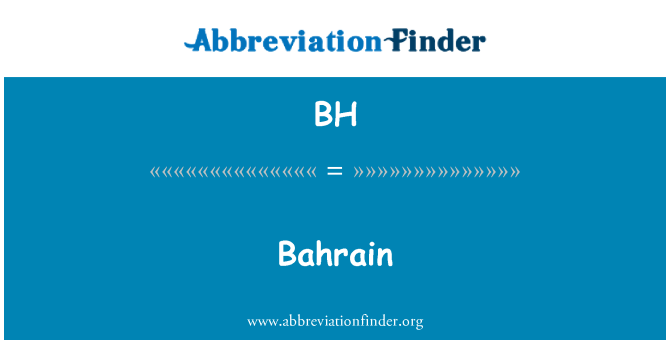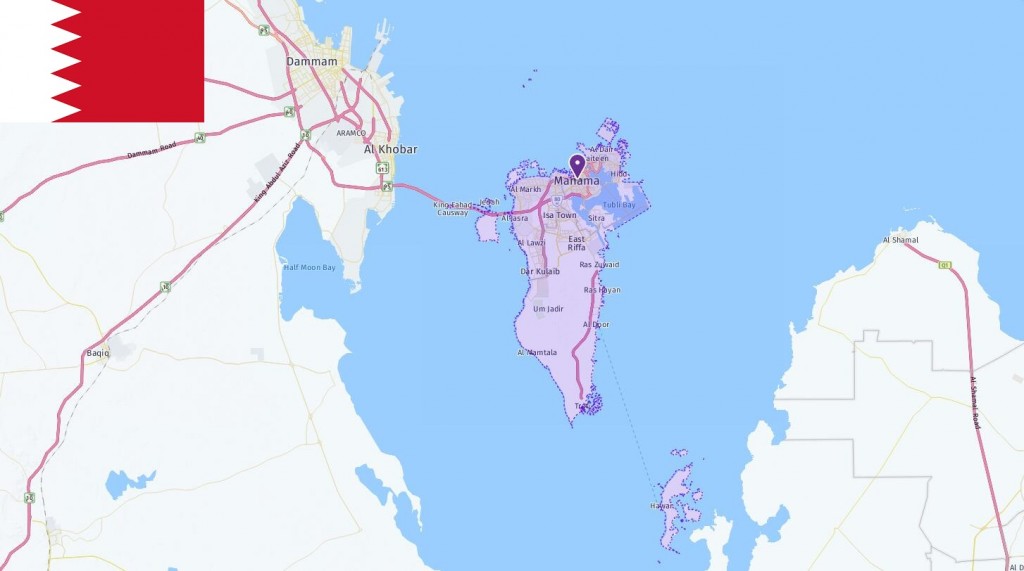BH is the abbreviation for Bahrain, the 174th largest country in the world. Officially Kingdom of Bahrain, Bahrain is a country located in Western Asia. Manama is the capital city of Bahrain. Other major cities include Manama (population: 147,074), Al Muharraq (population: 97,458), Ar Rifā‘ (population: 79,550), Dār Kulayb (population: 65,466), Madīnat Ḩamad (population: 52,718), Madīnat ‘Īsá (population: 38,090), Sitrah (population: 37,657), Jidd Ḩafş (population: 31,735), and Al Ḩadd (population: 12,797).
Country Profile
- Capital: Manama
- Language: Arabic
- Area: 778.3 km2
- Population: 1,425,171
- Currency: Bahraini dinar (BHD)
- Time zone: UTC+3
- Calling code: 973
- ISO 2-Letter Abbreviation: BH
- UN 3-Letter Abbreviation: BHR
- Internet TLD: .bh
- State Government Website: http://e.gov.bh
List of Bahrain Acronyms
The most commonly used abbreviations about Bahrain are BH which stands for Bahrain and BHD which means Bahraini dinar (Bahrain currency). In the following table, you can see all acronyms related to Bahrain, including abbreviations for airport, city, school, port, government, and etc.

Geography
Bahrain is a small island state in the Gulf of Persia consisting of over 30 islands. Norway is four hundred times the size of Bahrain. People live on six of the islands, where the low-lying island of Bahrain is the largest. From here there is a bridge connection to three of the other major islands, as well as neighboring Saudi Arabia
Over 90 percent of Bahrain’s land is sandy desert and only 2.9 percent of land is arable land. Although the country has a lot of desert, Bahrain is greener than many other countries in the region. Several of the growth starts have adapted to the desert and the saline environment. The climate is warm and dry, with high humidity in the summer months. The temperature can reach 50 °C.
The once-large freshwater reserves are long used, and most of the water is desalinated from the sea. Desertification is one of the most important environmental problems, as well as pollution of the sea as a result of oil spills.
History
The area that today constitutes Bahrain has been populated for more than 4,500 years. The al-Khalifa family took power in 1783. The occupation took place with support from the al-Sabah family in Kuwait and the al-Saud family in today’s Saudi Arabia. These three Sheikh dynasties are still in power in their respective countries. Several major powers claimed Bahrain after the al-Khalifa family’s takeover. The archipelago eventually sought protection from the United Kingdom, after which the country became British protectorate until independence in 1971.
Both before and after independence, there were several riots against the regime. In 1994, the citizens demanded political reform, and the new emir after the change of throne in 1999 showed a desire to modernize the country. But the new constitution in 2002 did not meet the expectations of its citizens, partly because the al-Khalifa family consolidated its power. Nevertheless, women’s living conditions became noticeably better in 2002, when parliamentary elections were held where women were also allowed to stand as candidates. The election was the first in Bahrain in 30 years.
Democracy rebellion during the Arab Spring of 2011 was hard hit, with the help of member countries of the Gulf Council (GCC), especially Saudi Arabia. The authorities believed the demonstrations were backed by Iran and were an attack on Sunni Muslims. The Emir managed to stifle the uprising, and in the aftermath followed mass arrests of regime critics. Over 1600 people were arrested. Several reports from human rights organizations tell about the use of torture and violence. In 2013, protests and demonstrations were banned in the capital Manama. In recent years, the justice system has constantly condemned Shia Muslim opposition, while police and security guards have been acquitted of crimes against protesters.
Society and politics
Bahrain is a constitutional monarchy, ruled by the Sheikh dynasty al-Khalifa. The country’s top leader, Hamad ibn Isa Al-Khalifa, and his family hold significant political and military positions. The National Assembly, which was dissolved in 1975, but restored in 2002, consists of 40 elected members of the House of Representatives as well as a council of 40 members appointed by the King. Political lists were allowed in 2002, but parties are still banned.
According to reports, Bahrain’s government regularly violates the citizen’s freedom of expression and press. The unrest that is still going on in the country is largely due to the protracted conflict between Shi’ite and Sunni Muslims. Since independence, Bahrain has pursued a pro-Western foreign policy, and in 2014, the regime decided to participate in the US-led war against the Islamic State (IS). As part of the war on terror, the use of social media was curtailed. They also closed the TV channel Al-Arabs because they showed an interview with a Shia Muslim opposition politician.
Bahrain has had a territorial discrepancy with neighboring Qatar for several years, and since 2017 the island kingdom has participated in several sanctions against Qatar along with other Arab countries.
The social welfare system is well developed and the standard of living is quite high. The situation for women in the country is better in Bahrain than in neighboring countries. They have the right to own and inherit property, have their own passports and can travel without a male relative. They can also choose what kind of clothing they want to wear. Nevertheless, working life is far from equal, and women receive lower wages for equal work.
Economics and Commerce
Bahrain is a rich state, thanks to large oil and gas resources. Oil recovery started for the first time in 1932. Before that, the country’s economy was based on trade. Later, the oil has formed the basis for the country’s economy. In 2018, it became known that the archipelago has made new major discoveries of oil and gas. That could make Bahrain a bigger petroleum player than ever.
Bahrain became one of the most important banking centers in the Gulf of Persia in the 1980s. This position has later been challenged by other countries, and got a crack as a result of the uprising in 2011. But in recent years much has improved, especially thanks to the growing tourism in the country. Formula 1 races, which have been held in Bahrain since 2004, have also helped to strengthen the country’s position as an international center.
Agriculture accounts for only 1 percent of Bahrain’s gross domestic product (GDP), because less than 3 percent of the land is arable land. Production consists mainly of vegetables and dairy products.
View this article in other languages:
Deutsch – Français – 繁體中文


